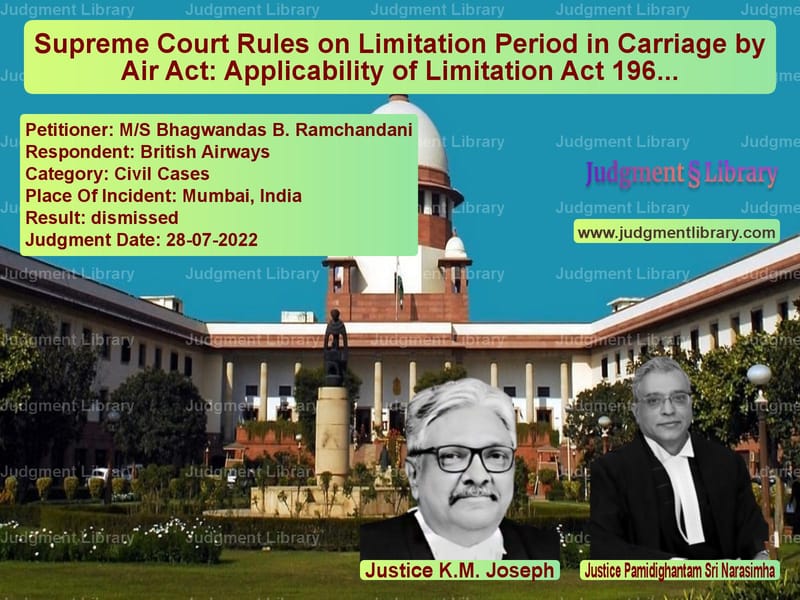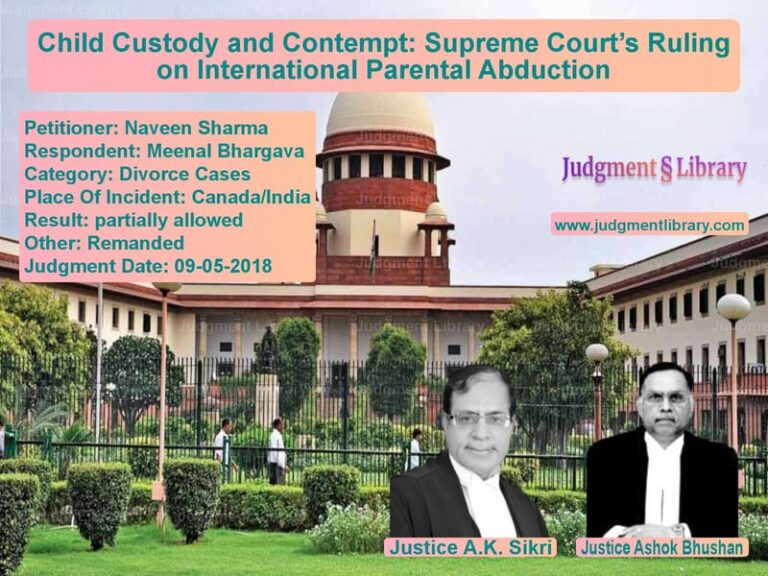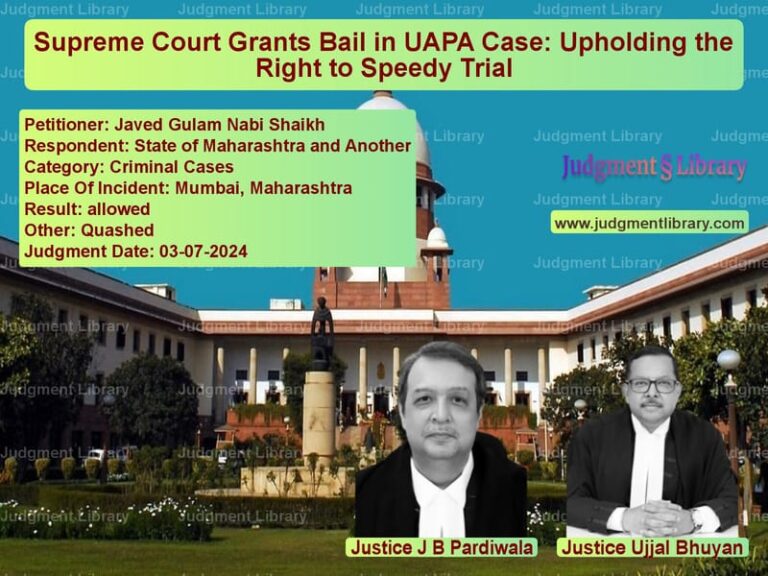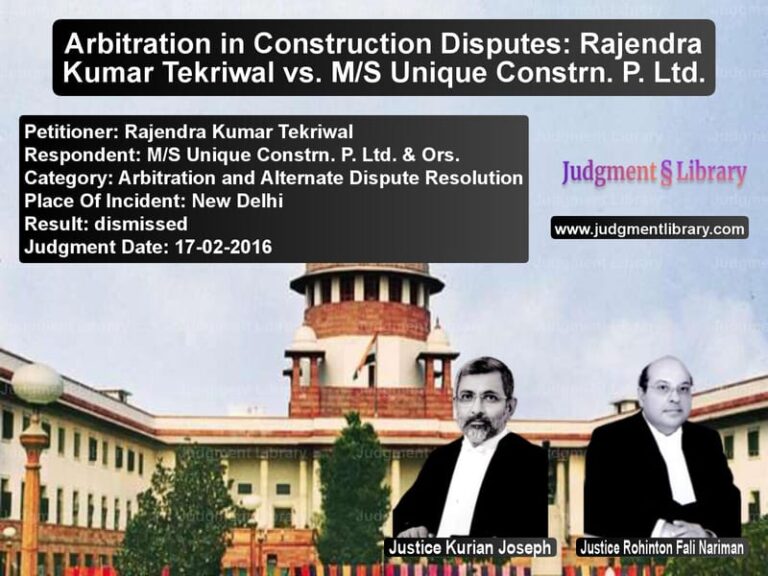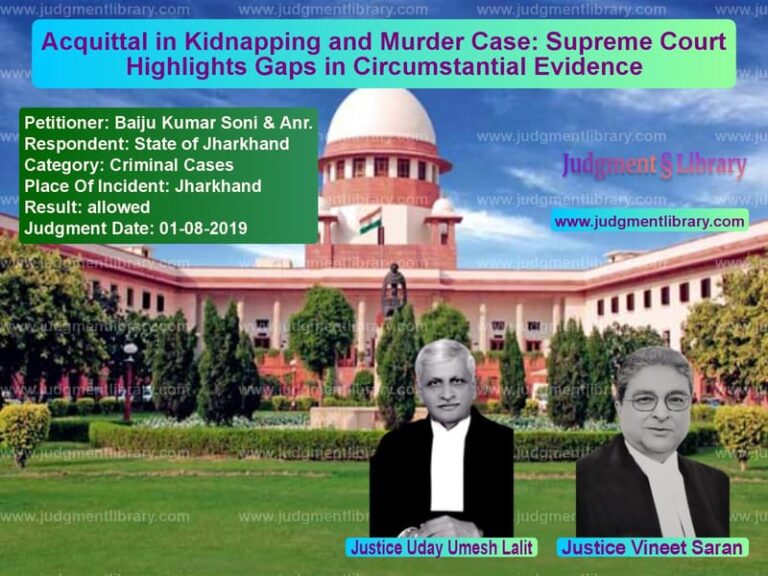Supreme Court Rules on Limitation Period in Carriage by Air Act: Applicability of Limitation Act 1963
The Supreme Court’s decision in M/S Bhagwandas B. Ramchandani vs. British Airways addressed an important legal question regarding the applicability of the Limitation Act, 1963 to claims under the Carriage by Air Act, 1972. The case revolved around whether the two-year limitation period under Rule 30 of the Second Schedule of the Air Act overrides the provisions of the Limitation Act, which allows for the exclusion of certain periods when computing the limitation.
Background of the Case
The appellant, M/S Bhagwandas B. Ramchandani, was engaged in the import and export business. It had sent consignments of perishable goods, such as fruits and vegetables, from Mumbai to Canada via British Airways. Due to delays, the cargo perished and was destroyed, leading the appellant to claim compensation.
The appellant’s cargo faced two separate instances of damage:
- On January 4, 2010, a shipment was delayed in London due to bad weather, leading to the spoilage of perishable goods.
- On June 30, 2010, another shipment was delayed due to packaging issues, which again led to the destruction of the cargo.
British Airways initially acknowledged the claim and offered to settle 50% of the claim amount via email on November 2, 2010. The appellant, however, did not accept the settlement and eventually filed a suit before the Mumbai City Civil Court on September 15, 2012, seeking compensation of ₹9,17,642.56 along with 21% interest.
Legal Arguments
Petitioner’s (M/S Bhagwandas B. Ramchandani) Arguments
The petitioner argued that:
- Under Section 29(2) of the Limitation Act, unless expressly excluded, its provisions apply to all laws prescribing a distinct limitation period.
- Rule 30 of the Carriage by Air Act does not explicitly exclude the Limitation Act, making the Limitation Act applicable.
- Rule 30(2) of the Second Schedule provides that the method of calculating the limitation period must be determined by the law of the court seized of the matter, which includes the Limitation Act.
- Since British Airways had acknowledged liability and attempted a settlement, Section 18 of the Limitation Act (acknowledgment of liability) should apply to extend the limitation period.
Respondent’s (British Airways) Arguments
British Airways countered with the following points:
- The Carriage by Air Act, 1972 is a special statute that overrides the general provisions of the Limitation Act.
- Rule 30(1) of the Second Schedule explicitly states that the right to damages shall be extinguished if an action is not brought within two years. This means the right itself ceases to exist, not just the remedy.
- International legal precedents from the UK, USA, and Australia have established that the two-year limitation period under air carriage conventions is absolute.
- The Limitation Act applies only to cases where a right is preserved but the remedy is barred, whereas Rule 30(1) extinguishes the right itself.
Supreme Court’s Observations
The Supreme Court, led by Justices K.M. Joseph and Pamidighantam Sri Narasimha, examined the case with reference to international conventions, judicial precedents, and statutory provisions. The key observations were:
- Rule 30 of the Second Schedule is based on the Hague Protocol (1955) and the Warsaw Convention (1929).
- Under international law, a strict time bar is necessary to maintain uniformity in aviation-related claims.
- The phrase ‘right to damages shall be extinguished’ in Rule 30(1) implies that once the two-year period expires, the right ceases to exist entirely.
- By contrast, the Limitation Act only bars the remedy but does not extinguish the right. Since Rule 30 explicitly extinguishes the right, the Limitation Act has no application.
- Courts in the UK, USA, and Australia have consistently held that air carriage conventions impose a rigid limitation period that cannot be extended by national laws.
Final Judgment
The Supreme Court ruled:
“Rule 30 of the Carriage by Air Act, 1972, expressly excludes the applicability of the Limitation Act, 1963. The two-year limitation is absolute, and no extension is permitted.”
Accordingly, the appellant’s claim was deemed time-barred, and the appeal was dismissed.
Key Takeaways
- Extinguishment of Right: Unlike the Limitation Act, which only bars remedies, the Carriage by Air Act extinguishes the right itself after two years.
- International Consistency: The Supreme Court aligned its decision with international jurisprudence, ensuring uniform application of air carriage laws.
- Special vs. General Law: The judgment reaffirmed the principle that a special statute (Carriage by Air Act) takes precedence over a general law (Limitation Act).
- Implications for Airlines and Passengers: Claimants must initiate legal action within two years from the date of arrival or expected arrival of the flight.
Conclusion
The Supreme Court’s decision in M/S Bhagwandas B. Ramchandani vs. British Airways provides clarity on the interplay between the Carriage by Air Act, 1972, and the Limitation Act, 1963. It establishes that claims under the Air Act must strictly adhere to the two-year limitation period and that no exceptions or extensions under the Limitation Act are permissible. This ruling ensures legal certainty for both airlines and claimants while maintaining consistency with international air carriage laws.
Read also: https://judgmentlibrary.com/supreme-court-clarifies-land-acquisition-process-under-2013-act/
Petitioner Name: M/S Bhagwandas B. Ramchandani.Respondent Name: British Airways.Judgment By: Justice K.M. Joseph, Justice Pamidighantam Sri Narasimha.Place Of Incident: Mumbai, India.Judgment Date: 28-07-2022.
Don’t miss out on the full details! Download the complete judgment in PDF format below and gain valuable insights instantly!
Download Judgment: ms-bhagwandas-b.-ra-vs-british-airways-supreme-court-of-india-judgment-dated-28-07-2022.pdf
Directly Download Judgment: Directly download this Judgment
See all petitions in Contract Disputes
See all petitions in Consumer Rights
See all petitions in Damages and Compensation
See all petitions in Other Cases
See all petitions in Judgment by K.M. Joseph
See all petitions in Judgment by P.S. Narasimha
See all petitions in dismissed
See all petitions in supreme court of India judgments July 2022
See all petitions in 2022 judgments
See all posts in Civil Cases Category
See all allowed petitions in Civil Cases Category
See all Dismissed petitions in Civil Cases Category
See all partially allowed petitions in Civil Cases Category

